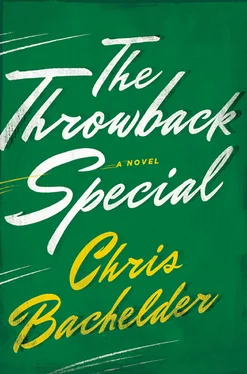Since Peter used a side entrance, the men who had entered the lobby — even Robert in his stuffed chair — did not notice him. The woman at the front desk looked up and smiled at Peter as he passed, but he did not acknowledge her. He walked to the dining area, where he filled a cup with water at the juice dispenser. Upon opening the microwave he was momentarily stunned by the miasma of irradiated popcorn. He blinked his eyes against the vapors, steadied his legs. The interior of the microwave, like the interiors of all public microwaves, resembled the scene of a double homicide. He put the cup inside, closed the door, and programmed the oven to heat the water on high for one minute and fifty-six seconds. The start button was concave with history, like the stone steps of an ancient cathedral. The microwave rattled and popped. A dim interior bulb cast a faint yellow glow on the revolving cup and the spattered walls. A sign on top of the microwave, framed like the photograph of a family pet, asked that microwave users please demonstrate a respectful attitude toward fellow users. The clip art image on the sign, inexplicably, was of a guitar. Peter paced as the green digital numbers descended toward zero. He touched the new mouthguard in his pocket. On his phone he checked the weather, sent a text, renewed a prescription. He stood on his left leg, flexing his right knee. He had reached an age when a sore knee might mean either that the knee was sore, or that the knee was shot. He frequently had occasion to consider the phrase bone on bone . The microwave oven rattled along like some World’s Fair exhibit. Could this really be, in our age, the fastest method for heating things up? Peter looked around, but there was nobody else in the dining area. A long banner above the continental buffet station welcomed Prestige Vista Solutions. On television, heavy wind pushed a car across a tennis court, eliciting nervous laughter and censored profanity from the amateur videographer. Peter ran his hand through his hair, which he had allowed to grow long in anticipation of a Saturday afternoon haircut from Carl. He did not particularly like Carl’s haircuts, but he got one every year, and he worried that he would hurt Carl’s feelings if he did not sign up. Peter stopped the microwave with two seconds remaining, and removed the hot cup of water. Then, following directions he knew very well, he dropped the new mouthguard into the slow boil. It floated there like a translucent semi-sessile annelid, the kind of tubular aquatic worm that is capable of regeneration. He left the guard in the water for slightly longer than directed, and instead of rinsing it quickly in cold water, as the instructions exhorted in bold font, he placed it directly into his mouth. He bit down hard, sucked vigorously to remove the air and water. He looked around, but there was nobody else in the dining area. The plastic was soft, and it tasted like synthetic butter. With his finger Peter pressed the scalding plastic into his gums; with his tongue he pushed the guard into the back of his top and bottom teeth. He sculpted the guard, made it his own. It was now unique. After a minute, which he counted more or less accurately in his head, he extracted the mouthguard and rinsed it in cold water from the juice dispenser. He put the mouthguard back into his mouth, and looked around. If the fit was not good, he could boil the mouthguard again. The fit was good, but he decided to boil the mouthguard again.
IN THE MEN’S RESTROOM off the lobby — frequently the subject of online reviews — the countertop and floor were wet, not as if an employee had recently cleaned them but as if firefighters had recently managed a blaze. A light above a corner stall was flickering dimly, reinforcing for Carl the correlation between luminance and civilization. In a brightly lit stall with the door closed, Carl pinched pills from his pocket and swallowed them without water. He reached beneath his damp Jim Burt jersey to touch the strange, tender bump that had recently appeared in his armpit, gently at first and then with painful pressure. The bump was hard, and it would not flatten or disperse with the force of his fingers. It seemed not to contain fluid. Perhaps he could show it to Charles, whom he knew to be a doctor of some kind. Hanging from a hook on the back of the door was the sort of brown canvas shoulder bag used by practitioners of the soft sciences. Carl removed the bag from the hook, and looked inside. He found two books, one called A Better Mirror , and the other titled A Clinical Guide to Anorexia, 4th Edition . He dropped the books loudly on the wet floor, along with a thick three-ring binder, a day planner, and a manila envelope labeled “Protocols.” In the front pocket of the leather bag Carl found a DVD with the handwritten title “Marla Sessions.” He put the DVD into his coat pocket. He also took a large, pungent rubber band and a black Sharpie. He removed the top of the Sharpie and turned to face the broad blue partition of the stall. The surface was clean, though its gloss had been scuffed and dulled by solvents and abrasives. There was nothing on the wall to which to respond, no lewd conversational thread he could join with arrow and riposte. He didn’t want to draw a dirty picture. He didn’t want to insult someone’s penis, or testicles. He didn’t want to scribble song lyrics or to extol marijuana. The wall was so blank, so clean. He was committed to writing on it, but he didn’t want to misquote Nietzsche or Camus. He didn’t want to request a sexual act or to offer sexual services or to say anything at all about gays, blacks, Muslims, Jews, or God. He didn’t want to post a threat. He didn’t want to compose or transcribe a limerick about constipation. His shoulder began to ache from holding the pen aloft. The light above the corner stall flickered. The beginning was the most difficult part.
THE MEN CONGREGATED in the lobby, within the formidable purview of the enormous clock. Many held shoulder pads and helmets. Many had tied the laces of their cleats together, draped the laces over their shoulders. Gil demonstrated, with his hands, the size of the kitten he had found beneath his gazebo. Chad nodded, far more troubled by Gil’s gazebo than by his kitten. Myron, with that startled look on his face, sought out Charles. Jeff tried to discern what seemed different about Trent, this year’s commissioner. Trent had gained a lot of weight, perhaps thirty pounds, but the change was not remarkable. The men had reached an age when they gained and lost significant things in relatively short periods of time, and it was not unusual for someone to show up in November having acquired or divested weight, God, alcohol, sideburns, blog, pontoon boat, jewelry, stepchildren, potency, fertility, cyst, tattoo, medical devices that clipped to the belt and beeped, or huge radio-controlled model airplanes. The added weight seemed to coincide with Trent’s leadership role, and it contributed to his authority as commissioner.
An aerial view of the lobby would have revealed more or less concentric arcs around the dry fountain, or perhaps around Derek, who was sitting, in flagrant contravention of a handwritten sign, on the fountain’s edge. The general effect was not unlike the standard model of the atom. Randy, sitting glumly on a bench upholstered with a pattern of Eiffel Towers and poodles, was a distant outlier, as was the woman at the front desk, who was conducting Internet research on a bartending school called Highball Academy. (“We should totally do it,” her friend had recently told her.) The men looked frequently at the clock, like pupils at a teacher. They looked occasionally at the woman, who so powerfully ignored them all. And they looked only rarely at Randy, who merely by sitting there unhappily collected from the beholder a kind of tax or levy in the form of an automatic withdrawal of sentiment. Randy was a figure who demanded the viewer’s sympathy or disdain, and the other men resented having to make that choice, with all of its implications. To look at Randy was to have an aggressive confrontation with oneself, which was not what the men wanted this weekend, or ever. Randy’s socks had lost their elasticity, of course, and they pooled lugubriously around black shoes whose heels had been wrecked by pronation. His herniated duffel bag lay at his feet. He had been unable to zip it completely, and in the unzipped bulge the men could have seen, had they been looking toward Randy, a small piece of the new and astonishingly white Jeff Bostic jersey. What most of the men had learned by now was that Randy’s Bostic gear from the previous year had been stolen, according to Randy, from a self-storage unit outside of Wilmington, Delaware, and that Trent, using the discretion of the commissioner, had spent the dues money to replace the equipment rather than to rent out the conference room, which had been reserved by a baleful organization called Prestige Vista Solutions. What many of the men would suspect — and they would be correct — was that Randy, having lost his eyewear business, had sold the equipment in an online auction.
Читать дальше












